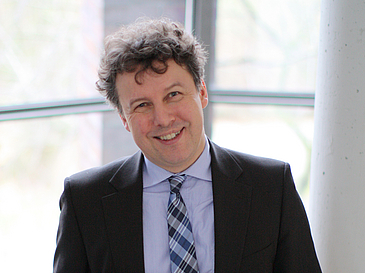Another special feature is that the computer scientist from the University of Bremen and head of the Cyber-Physical Systems Research Division of the German Research Center for Artificial Intelligence (DFKI) is receiving this funding for the second time. This has never been seen before in the history of DFG funding.
| Rolf Drechsler has been researching secure hardware and software systems for many years. He is one of the world's leading scientists in the field of synthesis, verification and testing of digital circuits. Copyright: Lisa Jungmann / University of Bremen |
"I congratulate Professor Drechsler most warmly on this success," says the Rector of the University of Bremen, Professor Bernd Scholz-Reiter. "The fact that he is receiving this funding for the second time shows the confidence that the DFG has in the expertise and experience of this scientist. Rolf Drechsler has been researching secure hardware and software systems for many years. The 50-year-old is one of the world's leading scientists in the field of synthesis, verification and testing of digital circuits. "Swiss Army Knife" for testing procedures What is the project about? "The digital revolution has dramatically changed our lives. After computers, the Internet and modern mobile devices, digitization is now making its way into many traditional industries," says Drechsler. The basis of this revolution, he says, are so-called digital logic circuits. These are small components that make electronic data processing possible in the first place. In order for them to do their job, the circuits of digital devices have to work flawlessly, but experience shows that this is not the case in practice. Testing the individual systems individually takes a lot of time. In his project, the computer scientist therefore wants to try out special procedures that test as many systems as possible under all conditions. These procedures are called "formal verification techniques" and should run in the background so that users do not have to deal with them. "They are intended to become a kind of 'Swiss Army Knife' for the verification of digital circuits from practical experience," explains Drechsler. The title of the project is: "PolyVer: Polynomial Verification of Electronic Circuits". "I am very pleased that the second Koselleck project gives me the freedom to try things out in order to advance technical development in the digital world in the long term," says the scientist. In addition, the young scientists will benefit from this. About Reinhart Koselleck Projects Reinhart Koselleck Projects stand for more freedom to promote particularly innovative research that is risky in a positive sense. Researchers should therefore have the courage to take risks. The DFG makes them available only to researchers who can demonstrate special achievements in their scientific fields. The programme is named after Reinhart Koselleck, one of the most important German historians of the 20th century, who died in 2006. In Germany he was one of the founders of modern social history. Koselleck was regarded as a lateral thinker. Further information: www.dfg.de/foerderung/programme/einzelfoerderung/reinhart_koselleck_projekte/index.html Prof. Dr. Rolf Drechsler University Bremen |

